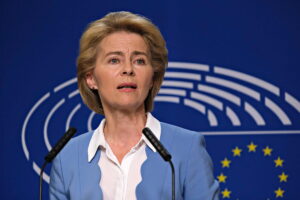
President of the European Commission Ursula von der Leyen says that the European Union and its member states have provided EUR 145 billion in assistance to Ukraine.
“The European Union and its member states have supported Ukraine with 145 billion euros. This is more than anyone else has helped,” von der Leyen said during the Support Ukraine plenary session in Kyiv on Monday.
According to her, the EU has helped Ukraine cover the country’s budget deficit for the entire year 2025.
“In parallel, we must immediately provide weapons and armaments. And this will be at the center of our work over the next few weeks,” the European Commission President emphasized.
She also emphasized that Europe will strengthen Ukraine “at this critical moment”.
“I can announce that a new payment of 3.5 billion euros to Ukraine will be received in March,” von der Leyen said.

President of the European Commission Ursula von der Leyen announced the integration of the energy markets of Ukraine and Moldova into the European market by the end of next year.
“The European Commission has prepared an ambitious energy security package. The goal is to guarantee a sustainable, secure and competitive energy system for Ukraine,” she said on Monday in Kyiv, speaking at the Support Ukraine plenary session.
According to von der Leyen, during this winter, Europe provided Ukraine with 1.8 GW of electricity. “But now we will fully integrate the Ukrainian and Moldovan electricity markets into our European one by the end of next year. And we will use a potential volume of 80% of all gas reserves, which will help create profitability. All this will increase the energy security of both the European Union and Ukraine,” the President of the European Commission said.

The agriculture ministers of Hungary, Bulgaria, Romania and Slovakia have called on the European Commission to return to pre-war quotas after the end of autonomous trade measures in trade in Ukrainian agro-products, Hungarian Agriculture Minister Istvan Nagy said on Facebook.
“There are things we do not allow! We protect the interests and livelihoods of farmers from Ukrainian agricultural products. In a joint letter with my colleagues the agriculture ministers of Bulgaria, Romania and Slovakia called on Brussels to take action,” he wrote.
The Hungarian minister recalled that the EU regulation governing imports from Ukraine ends in June 2025, so the European Commission must find a long-term solution to market difficulties arising on the European market due to Ukrainian agricultural products.
“In the joint letter, we called on the committee to return to pre-war quotas, to introduce measures to protect agricultural products, to introduce automatic protection and individual quotas for member states on a regional basis. In addition, we also asked Brussels to require EU plant health and health protection, animal welfare, health and environmental protection for Ukrainian agricultural products,” Nagy said.
He specified that Hungary wonders whether Brussels will take into account the interests of Eastern European farmers this time or betray them again, as it happened in September 2023, when the ban on imports of Ukrainian agricultural products to the EU was not extended.
Nagy assured that Hungary will keep import restrictions on Ukrainian agricultural products in its national jurisdiction as long as there is no need to protect Hungarians.
“We are in solidarity with Ukraine, but we will protect the viability and competitiveness of farmers,” the Hungarian agriculture minister summarized.

Chernihiv-based Proviant Group of Companies, headed and owned by Valentyn Zaporoshchuk (Ichnia and MamaMilla brands), purchased the bankrupt Gadyachsyr cheese factory (Poltava region) at a second auction on Prozoro.Sale on February 17.
According to the trading platform, the price of the cheese plant was UAH 99.2 million at the first auction in September 2024. At the second auction, which was held on the principle of a Dutch auction (downward bidding – IF-U), Gadchsyr was sold for UAH 44.03 million, which is 40% cheaper than the starting price. Full payment is expected within 10 business days, i.e. by March 4, 2025.
The new owner will receive a complex of industrial buildings and auxiliary facilities of the Gadyachsyr plant, two land plots of 4 hectares and 0.7 hectares, as well as almost 900 inventory items of various equipment.
“Gadyachsyr was declared bankrupt in 2023. The company was part of Ruslan Badayev’s Almira holding. The state register lists Oleg Balyuk as the ultimate beneficiary.
As reported, according to the decision of the Shevchenkivskyi District Court of Kyiv of May 14, 2018, published in the Unified State Register of Court Decisions, Ukreximbank officials issued loans to Agroprodeexport and Tekhmolprom secured by illiquid property of the state bank in order to. According to the investigation, the total debt of Agroprodeexport and Tekhmolprom, as well as the company International Seafood Group LLC, on these loans amounted to UAH 2.1 billion.
“Tekhmolprom was founded in 2007. The company’s core business is milk processing, butter and cheese production. Agroprodexport was founded in 2007 and is primarily engaged in wholesale trade of dairy products, eggs, edible oils and fats. RVD-Agro LLC was founded in 2003. The company specializes in growing cereals (except rice), pulses and oilseeds.
The ultimate beneficial owner of Agroprodexport, RVD-Agro LLC and Tekhmolprom LLC is Oleh Balyuk. He is also the ultimate beneficiary of Gadyachsyr, which is listed as a legal entity associated with the three borrowing companies.
Proviant LLC was founded in 2003 in Chernihiv. It specializes in milk processing, butter and cheese production, wholesale of dairy products, eggs, edible oils and fats.
According to Opendatabot, in 2023, the company’s revenue amounted to UAH 74.683 million, net profit – UAH 8.3 million, and debt obligations – UAH 675.95 million. The assets are estimated at UAH 122.32 million.
Zaporoshchuk acquired Proviant LLC in October 2021 from Oleksandr Ivanov.

Last year, non-resident companies supplying electronic services declared UAH 12.1 billion in VAT, of which they paid UAH 11.2 billion, which is almost 40% more than in 2023, Danylo Hetmantsev, chairman of the Parliamentary Committee on Finance, Taxation and Customs Policy, said in his telegram channel on Sunday.
According to him, the number of payers of the “Google tax” increased by 29 non-residents over the year to 130 as of January 1, 2025.
“Having reported for the fourth quarter of 2024, budget revenues in January-February 2025 amounted to about UAH 3.5 billion (EUR 39.5 million and $43.5 million). I would like to note that the trend is only increasing, because compared to the same period in 2024, revenues increased by UAH 1 billion,” the Chairman of the Rada Committee cited the data.
Hetmantsev noted that the leaders in the declaration of VAT on digital services in the fourth quarter of last year were Google, Apple, VALVE CORPORATION, ETSY, META platforms, WARGAMING GROUP, Sony and Netflix.
“By the way, Bolt and Uklon platforms have paid about EUR4.5 million or UAH 200 million in tax in 2024,” he emphasized.
As reported, in 2021, the Verkhovna Rada passed a law on the “Google tax”, which proposes to equalize the taxation rules for international technology companies with those of Ukraine. In particular, it stipulates that international companies operating in the information space of Ukraine and earning money from online advertising will pay taxes in Ukraine, including VAT.

In 2024, Metinvest Mining and Metallurgical Group significantly increased its total exports and sales of iron ore to more than 12 million tons and significantly reduced production costs, Metinvest CEO Yuriy Ryzhenkov said in an interview with Forbes Ukraine.
“We have fully returned to the operational efficiency improvement program. For example, we have reconfigured our business process to use our own raw materials. And by most indicators, I mean technical, technological, and production ones, we have returned to the best results of 2020-2021,” the CEO stated.
According to him, the main disadvantage is the electricity outage and problems with its import. Another problem is the increase in tariffs for the services of natural monopolists, primarily the increase in electricity transportation tariffs and logistics. In addition, the aggressor’s offensive towards Pokrovsk. As a result, the group was forced to suspend the mine’s operations due to the inability to ensure electricity supply and safety factors for employees.
“We were preparing for this and diversified our supply chain for the same coal – we contracted as much as we could from other companies and shipped it for Ukraine’s needs from our plant in the US. We will definitely not stop steel production because of the temporary shutdown of the Pokrovsk mine. But it will have a serious impact on the company’s economy. Instead of supplying coal via the nearest logistics route, from Pokrovsk to Zaporizhzhia and Kamianske, we will now have to buy coal all over the world, and the logistics component will have a significant impact on our production costs. In general, up to 10% of the cost of coal,” said the CEO.
Answering a question about Donald Trump’s economic policy and expectations for the consequences for the global economy, Ryzhenkov explained that “it is not really known which initiatives of Donald Trump are serious and which are working to raise rates or invite to a dialogue.”
“We see tumultuous actions that make waves in the entire global economy, currencies, and so on. How will it all end? When a major power like the United States turns to protectionism, it is a serious problem for the global economy and, by the way, for the United States itself. It’s just that they will feel the consequences later – in three to four years,” the top manager predicts.
In turn, he noted that Metinvest’s deliveries to the US are insignificant – not even within the margin of error: “The largest share is pig iron, which is not subject to duty, and I think this will not change – it is the raw material for the American economy.”
Speaking about staffing issues, the CEO said that more than 20% of the group’s employees, or 30% of those liable for military service, are currently mobilized. Ryzhenkov believes that we need a normal, well-thought-out reservation system that will allow us to work. Reservations are not a privilege for business, as some say, but an integral part of preserving the economic basis of the state’s defense capability. If the economy does not work, Ukraine will lose the war, despite the support of the West.
As for the export strategy, it has not changed much compared to the period before the full-scale war.
“There are our key markets – Ukraine, the EU countries, where we supplied more than 50% of our products before the full-scale invasion. And then there are all the others, the so-called balance markets, which are characterized by a more opportunistic approach to supply. When it’s profitable for us, we go there, and when it’s not profitable, we don’t go there,” the CEO stated.
The Group’s key markets for iron ore are the EU countries. And the company has expanded them, entering Scandinavia and the Nordic countries. What we cannot sell in the EU due to limited consumption volumes is sold to Southeast Asia: China, South Korea, and so on, said the company’s CEO.
“The main thing we have focused on is the production of iron ore with a higher iron content, which is now in demand. We have already mastered its production at our joint venture, Pivdennyi GOK. Before the full-scale invasion, we did it at our Central GOK,” explained the CEO.
Regarding the forecast – what factors will have the greatest impact on exports in 2025 and what are the potential critical risks – Ryzhenkov divides them into several blocks. The first is to maintain the competitiveness of Ukrainian producers in foreign markets. This requires that state-owned monopolies do not create additional tariff pressure on operating businesses.
The second is maintaining access to foreign markets (it is important to preserve the liberalization of steel trade with the EU, the US, and the UK) and strengthening sanctions against the Russian metals and mining industry, which continues to sell slabs and pig iron to the EU because of the position of certain countries.
The third is a consistent environmental and industrial policy of the state on eco-modernization and decarbonization. Ukraine needs a delay in the CBA because of the war. And confirming the criticality of booking and engaging veterans in the workforce will remain a relevant factor because of the risk of losing qualified personnel.
“As for new challenges, it is access to financing for modernization and green transition projects in the mining and metals sector, as well as ensuring stable demand for Ukrainian steel in the domestic market. But these topics are post-war, and we can talk about them separately when peace comes,” the expert believes.
Speaking about the energy independence of Metinvest’s enterprises, the CEO said that the group has its own generation, about 45-50 MW, which provides the most critical processes – about 10% of the company’s energy consumption. Another 40 MW of gas-fired generation is under construction, which will be commissioned in 2025, and solar panels are also being installed.
Regarding investments, the CEO emphasized that due to security risks, the company cannot invest in Ukraine as before. There were serious investment plans in Mariupol, Kryvyi Rih, Zaporizhzhia, and Kamianske. Nevertheless, in 2024, the total investment volume reached about $670 million at the group’s sites in Ukraine. This includes both OPEX and CAPEX. As soon as the company is able to attract financing, there will be plans for large projects.
This year, we also have many plans, for example, a tailings pulp thickening project at Northern GOK and the repair of blast furnace No. 9 at Kametstal are being implemented at our own expense. The volume of investments in these projects in Ukraine alone is about $50 million.
Investment plans abroad include the largest project for the coming years – the construction of a green steel plant in Italy. The estimated cost of the joint project is EUR 2.5 billion.
Among other potential acquisitions, the company is interested in Eastern and Southern Europe – regions where it is possible to create synergies with the group’s existing business processes and Ukrainian assets. The company may take part in a tender for the sale of the Polish plant Huta Chestochowa, which once belonged to the Industrial Union of Donbass.
“In Ukraine, we have a $8 billion strategy for the green modernization of Ukrainian enterprises for 7-10 years. We are ready to launch this strategy as soon as the war is over and Ukraine receives security guarantees,” Ryzhenkov added.
“Metinvest is a vertically integrated group of steel and mining companies. The group’s enterprises are mainly located in Donetsk, Luhansk, Zaporizhzhia and Dnipro regions. The main shareholders of the holding are SCM Group (71.24%) and Smart Holding (23.76%), which jointly manage it.
Metinvest Holding LLC is the management company of Metinvest Group.